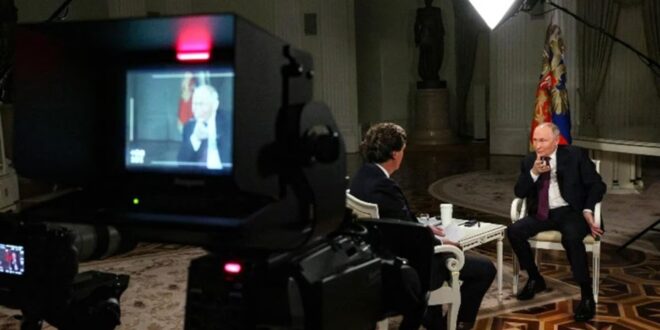In his interview with Tucker Carlson, in response to Carlson’s statement that the world is “breaking into two hemispheres,” Russian President Vladimir Putin said that “the world should be a single whole.” What did Putin mean?
The Emergence Of The Unipolar World Order And The Subsequent Transition From It
After the Cold war, the bipolar world collapsed, and the so-called “unipolar world order,” lead by the United States and its Western-liberal values, began to develop. This was the time in which Francis Fukuyama predicted the “end of history,” which entailed that liberal democracy would prevail as a permanent order. American political thinker Charles Krauthammer defined that period as the “unipolar moment,” since he was not sure whether it would be permanent or not.
According to anti-liberal Russian philosopher Alexander Dugin, the “unipolar moment,” which began in 1991, ended in 2000, with the formation of other poles. In particular, he maintained that this unipolar system began to erode with the 9/11 attacks by Islamic terrorists on the World Trade Center and with the rise to power of President Putin: “Then it seemed that the unipolar moment was no longer a unipolar world order, that something went ‘wrong’ with unipolarity. ‘Normally’ there should not have been such a thing as the terrorist attack of 9/11, because there was no state that could attack the United States, no civilization, no political system… Russia at that moment was in a very low situation with Yeltsin, and was on the verge of collapse after the Soviet Union. But Putin began to reaffirm Russia as a sovereign country. This was a kind of challenge to the unipolar system.”[1]
However, despite the emergence of new “poles,” the United States remained the main pole. Hence, the “unipolar moment” did not end but was definitely challenged. In fact, Dugin further stated that we live in a moment of “transition away from a unipolar world.”[2] However, according to Dugin, this transition should not be toward a bipolar world, as it was during the Cold war.
Not Bipolarity But Multipolarity
Putin himself is against the notion of returning to bipolarity. The Russian President told Carlson: “Listen, you have said that the world is breaking into two hemispheres. A human brain is divided into two hemispheres: one is responsible for one type of activity, the other is more about creativity and so on. But it is still one and the same head. The world should be a single whole, security should be shared, rather than meant for the ‘golden billion.’ That is the only scenario where the world could be stable, sustainable, and predictable. Until then, while the head is split into two parts, it is an illness, a serious adverse condition. It is a period of a severe disease that the world is now going through.”[3]
If for the Kremlin the ultimate goal is the destruction of the “unipolar world order” lead by the United States, it is actually clear that bipolarity is not desirable for Russia. The Soviet Union could compete against the United States, but that time has ended. Russia is not the Soviet Union and does not have enough political and economic power or influence to challenge the unipolar system, formed by the “Collective West” and its “peripheries.” For Russia, the emergence of a “multipolar world” is therefore better in order to contrast the West, since China has risen as a main global player.
Conclusion: Multipolarity Endangers Western-Liberal Values
This is what Putin meant when he said that the world should not be split into two but should be a single whole. He did not mean that the unipolar moment should go on, but rather that several poles should emerge and supposedly have the same power parity. A multipolar world order is often described by the Kremlin as being fairer and more harmonious since world poles would be cooperating with each other as a single whole.
However, the proponents of multipolarity are pushing for the emergence of new anti-liberal “poles” (such as Iran and even an Islamic caliphate)[4] to erode the Western-liberal-democracy system. This scenario would certainly endanger the U.S., its vital interests and mainly its values and strong conviction about the existence of inalienable rights, “that among these are Life, Liberty and the pursuit of Happiness.”
Yet, the West will have not only have to fend for itself against multipolarity but also against the “destructive woke globalism” (involving perpetual foreign wars, massive debt, and mass illegal immigration) that is causing the erosion of the unipolar moment more than anything Russia or any other adversary can ever do. The West will need to awaken and redefine itself in the Western liberal-democracy values of the 19th and 20th centuries (i.e., in classical liberalism) and not in the values of progressive liberal “woke” ideology, which has developed in recent decades and that shares alarming features with totalitarian regimes.
[1] Eurasianist-archive.com/2019/01/22/dugin-in-shanghai-multipolarity-unipolarity-and-hegemony, January 22, 2019. [2] Katehon.com/en/article/russian-iranian-partnership-multipolar-world, February 8, 2016. [3] En.kremlin.ru/events/president/news/73411, February 9, 2024. [4] Ria.ru/20231112/konflikt-1908909297.html, November 12, 2023. Eurasia Press & News
Eurasia Press & News



